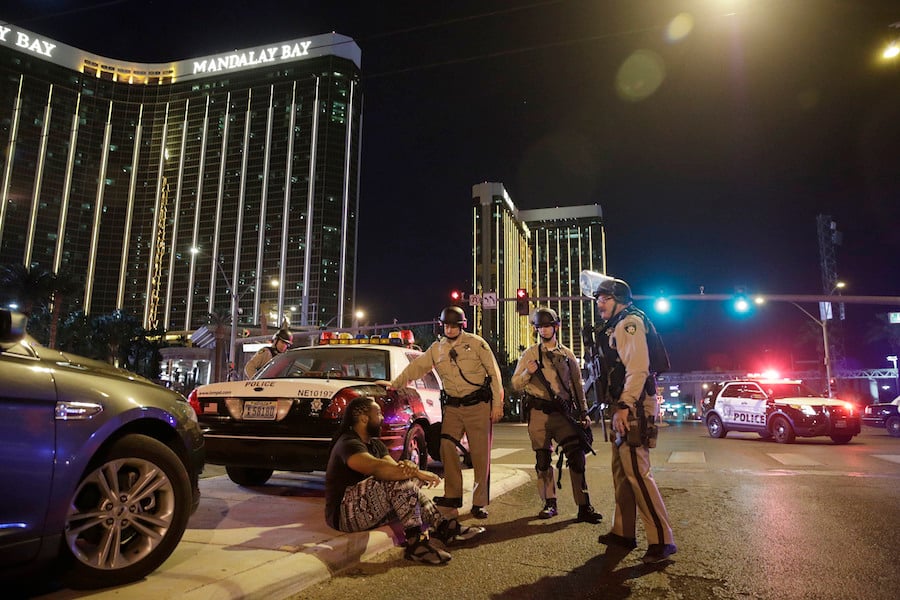RENO, Nev. (CN) — The Nevada Supreme Court ruled unanimously Thursday that state law grants immunity to gun makers and sellers from lawsuits pertaining to the 2017 mass shooting at a Las Vegas concert.
The court ruled the text of the law and the legislative history shield the gun companies from most liability, even if the guns at issue are proven to be illegal. The justices said the law could be changed by the Legislature but could not be altered by the judiciary.
The 20-page ruling stems from a federal suit brought by James and Ann-Marie Parsons, the parents of a woman killed at the Route 91 Harvest Festival massacre in October 2017. They sued Colt’s Manufacturing Company and others claiming the AR-15 weapons, which shooter Stephen Paddock used to kill 60 people and injure hundreds more in a matter of minutes, violated federal and state bans on machine guns.
“We urge the Legislature to act if it did not mean to provide immunity in situations like this one,” Justice Kristina Pickering wrote for the unanimous court. “But as written, [the law] declares a legislative policy that the Parsonses cannot proceed with these claims under Nevada law.”
The federal judge overseeing the case concluded the Parsons’ complaint sufficiently alleged that the gun companies were aware that their semiautomatic rifles could be “easily modified with bump stocks” to shoot automatically, similar to a machine gun, which Paddock had done. The judge did not definitively rule that the guns were in fact in violation of federal and state machine gun laws, only that the claims met a preliminary standard of review.
Having determined that the wrongful death and negligence claims against the gun companies had enough factual support, U.S. District Judge Andrew Gordon asked the Nevada Supreme Court to determine if a state statute granting immunity to gun makers and sellers applied in the case and therefore barred the Parsons’ state law claims.
The Parsons argued the state law was only meant to protect firearm makers and distributors from frivolous lawsuits, not suits claiming they unlawfully made or sold firearms that were restricted under the bans on fully automatic weapons like machine guns. The gun companies rebutted that the law protects them from all civil actions unless the product is defective or had malfunctioned.
Using the “plain language” of the law, Nevada’s highest court fell on the side on the gun companies. The statute reads, “No person has a cause of action against the manufacturer or distributor of any firearm or ammunition.” Pickering said the term “any firearm” dictated that the gun companies are shielded, even if the AR-15s are found to be illegal under the machine gun regulations.
“[The law] does not require that the firearm manufactured or sold be legal for a gun company to seek shelter from civil liability under it,” Pickering said.
Representatives for the Parsons voiced disappointment with the Nevada Supreme Court order.
"Under today’s ruling, a gun manufacturer or distributor has complete immunity even if it knowingly and intentionally violates federal and state law by engaging in the illegal sale of a machine gun with knowledge that it will be used to inflict harm upon innocent people," said Matt Sharp, a Reno lawyer for the Parsons, in a statement to Courthouse News. "This ruling is at fundamental odds with the intent of the Nevada Legislature and the safety of the public at large."
Pickering found the legislative history showed state lawmakers never intended to hold gun makers and sellers liable for conduct using illegal guns, even after they and Congress stringently regulated machine guns throughout the 1960s and 1980s.
“Congress and the Nevada Legislature recognized the grave danger that machine guns pose in civilian hands,” Pickering said. “Yet, despite the decision to impose criminal penalties for the manufacture and sale of machine guns unless federally authorized, the Nevada Legislature did not eliminate or amend [the law] to permit civil actions seeking damages for conduct alleged to violate those prohibitions when it enacted them.”
The court held that it was up to the Legislature to amend the law.
“We in no way underestimate the profound public policy issues presented or the horrific tragedy the Route 91 Harvest Festival mass shooting inflicted,” Pickering said. “If civil liability is to be imposed against firearm manufacturers and distributors in the position of the gun companies in this case, that decision is for the Legislature, not this court.”
This is not the first major case involving liability for the Las Vegas massacre — the deadliest mass shooting committed by an individual in U.S. history. In 2019, casino giant MGM Resorts reached a settlement of up to $800 million with the shooting victims and their families. MGM owned Mandalay Bay resort, where the gunman unleashed the bloodshed from his 32nd floor hotel suite, as well as the concert venue across Las Vegas Boulevard where 411 festival attendees were shot but survived.
More than 450 others suffered injuries in the ensuing panic. Authorities found Paddock's body in the suite, dead of a self-inflicted gunshot would. A motive for the massacre has never been determined.
Representatives for the various gun manufacturers and distributors involved in the case have not returned requests for comment.
Subscribe to Closing Arguments
Sign up for new weekly newsletter Closing Arguments to get the latest about ongoing trials, major litigation and hot cases and rulings in courthouses around the U.S. and the world.









